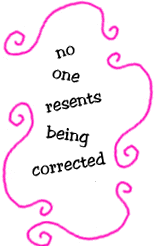 Q Dear Miss Abigail:
Q Dear Miss Abigail:
My best friend is acting really strange. She started hanging out with an old friend who always manages to get her in to trouble. I am really worried about her. Could you please help me find a way to tell her how I feel about her new old friend without hurting her feelings?
Signed,
Sunshine
A Dear Sunshine:
Let the strength of friendship swing into action! Time to tell your pal to stay out of trouble. I suppose this advice from The New Book of Etiquette isn’t terribly new anymore, since Lillian Eichler wrote it way back when. But I think still holds true, and should at least provide some good reading to you all. What better topic than friendship?
1924: The Ethics of Friendship
![]() It is not enough to make friends; you must know how to keep them. When you make a new friend whose friendship you value and wish to keep, learn his idiosyncracies and respect them. Learn his little peculiarities of manner and bear with him. Force yourself to be conscious always of the fact that while he has faults of which you are aware, you have faults of which he is aware. The ideal friend overlooks these little things and looks only for the big.
It is not enough to make friends; you must know how to keep them. When you make a new friend whose friendship you value and wish to keep, learn his idiosyncracies and respect them. Learn his little peculiarities of manner and bear with him. Force yourself to be conscious always of the fact that while he has faults of which you are aware, you have faults of which he is aware. The ideal friend overlooks these little things and looks only for the big.
Doubt and suspicion are fatal to friendship. A friend worth having is a friend worth trusting. In time of doubt there should be a frank explanation. A true friend will not listen to criticism from others regarding his friend; will never gossip about him; will protect him from slander; will refuse to hear or believe evil of him.
There should be absolute sincerity in friendship. If your friend has done something or said something of which you disapprove, go to him and talk to him about the matter. You are false to your friendship if you talk to others about it.
If you want to correct a friend for some mistake he has made, do so with all the grace and tact you would use in correcting a stranger. No one resents being corrected. It is the manner of the person who makes the correction that is usually resented. Your friend is certainly entitled to as much consideration as you show your acquaintances.
Too many of us feel that we can take liberties with our friends that we would not dare to take with strangers. Handle your friend’s book as carefully as you would the book of a new acquaintance, more carefully than you would handle your own. Do not feel that because it is with your friend that you have an engagement that you can be half an hour late. Real friendship is founded on courtesy, kindness, and understanding.![]()
Source: Eichler, Lillian. The New Book of Etiquette. Garden City, N.Y.: Garden City Publishing Co., 1924.
~pp. 74-75 ~